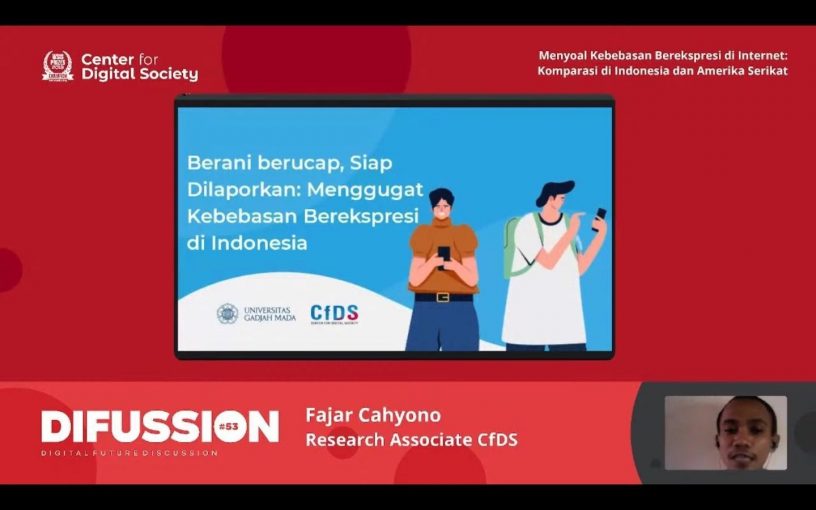
Yogyakarta, July 2nd 2021─The Center for Digital Society or CfDS FISIPOL UGM held the DIFUSSION #54 program entitled “Questioning Freedom of Expression on the Internet: Comparison in Indonesia and the United States” on Friday (2/7). The speakers in this event were Fajar Cahyono (Research Associate of CfDS) and Alfredo (Research Intern of CfDS). The event took place via Youtube Live at 03.30 p.m. to 05.00 p.m. and was moderated by Aldo Rafi Presnauli Siregar (Partnership Associate of CfDS).
Freedom of expression is one of the basic principles of modern democracy where civil liberties deserve to be respected and considered as a prerequisite for individuals to develop themselves. Freedom of expression in the modern age has become something that is strongly fought for even today. The reason is, the problem of freedom of expression is a new problem where the moral standards for speaking and the existing legal order are different in each country. In Indonesia, we have the ITE Law (UU ITE) which regulates articles on freedom of expression on the internet. However, the law is considered to still contain several rubber articles that are used as the basis for arresting or criminalizing someone.
Indonesia gave birth to a dilemma where freedom of expression becomes very important to fill a democracy that requires everyone to be active and involved in the life of the state, either formally or informally, but on the other hand there is a threat to individuals, especially related to the UU ITE which is currently one of the legal umbrellas. Based on Safenet’s data of 2017-2020, the most vulnerable groups as victims of criminalization with rubber articles are civilians, followed by activists, workers, journalists, students, and so on. Fajar Cahyono tries to review several examples of rubber articles, including article 27 paragraph 2 and article 28 paragraph 2 in which there are still phrases that have multiple interpretations.

“Regarding article 28 and also article 27, things that are indeed very multi-interpreted, intergroup race or insults need to be defined further and they also need to be defined more clearly,” he said.
Meanwhile, Alfredo tried to compare with the law in the United States. Freedom of expression is enshrined in the First Amendment to the United States Constitution and article 19 of the International Covenant on Civil and Political Rights (ICCPR). However, interestingly, the United States made reservations against Article 20 which regulates hate speech. As we know, freedom of expression and opinion is not a non-derogable right. Freedom of expression and opinion is a right that can be limited by taking into account and protecting other rights. The state must not make regulations that can endanger the freedom of individuals to express their opinions.
“We can see when there are people like them who want to make a claim against their rights being restricted by the United States, we can see that the justice system in the United States will refer to the first amendment, to the point that some commentators give the term that the right to freedom of expression in the United States is around 99% absolute, of course there are still some limits agreed upon by the United States itself,” he said.
